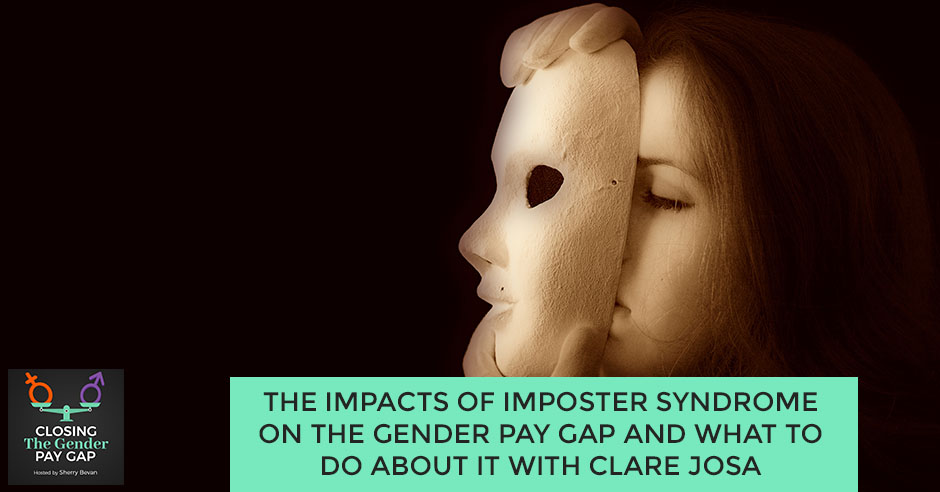Imposter Syndrome is already an issue for leaders, but the stigma imposed by gender only amplifies it. This can manifest itself in your organization in many ways, one of which is through the gender pay gap. Today, joining your host Sherry Bevan is the leading authority on Imposter Syndrome in the UK, Clare Josa. She speaks on her landmark research study about Imposter Syndrome to clearly define the phenomena and its impacts on the gender pay gap. She also discusses concrete examples of how it affects employees and leaders in the workplace. Plus, Clare shares tips for companies on how to be more proactive in dealing with Imposter Syndrome to promote an equitable workplace and empower its workforce. Tune in to this insightful discussion to learn more!
—
Listen to the podcast here
The Impacts Of Imposter Syndrome On The Gender Pay Gap And What To Do About It With Clare Josa
I’m excited, because in this episode we’re exploring how the imposter syndrome affects your gender pay gap. I’m delighted to be talking to Clare Josa. She is the UK‘s leading authority on imposter syndrome. She’s the author of eight books and an expert in the neuroscience and psychology of performance. Her original training as an engineer specializing in Six Sigma and Lean manufacturing means her inspirational approach is grounded in practical common sense, creating breakthroughs, not burnout. Naturally, we’re going to be talking about imposter syndrome and I hope you get something valuable from this to help you close your gender pay gap. Clare, welcome. Thank you so much for joining me.
Thank you so much for having me on the show, Sherry.
I’m delighted to have got you on because you’ve got so much experience but I’ve thought for those people reading, who maybe don’t know what we’re talking about when we refer to the imposter syndrome, perhaps you could start by giving us your definition of what it means.
Imposter syndrome is the secret fear that people are going to find out that we’re not good enough, that we’re faking it, that they made a mistake hiring us, that we don’t belong. It’s something that keeps us awake at 3:00 in the morning. I often define it with my clients, my students and my readers as the secret fear of others judging us, the way we’re judging ourselves. It’s different to self-doubt. What we found in the 2019 imposter syndrome research study is self-doubt is about what we can and can’t do. It’s about confidence, skills, and capabilities. Imposter syndrome is about who we think we are. It’s down there at the identity level, much deeper. Somebody running self-doubt might think, “I messed up that presentation.” If you’re running imposter syndrome as well, you’ll think, “What if they find out I’m not good enough?”
It’s that difference between who you are and what you think about yourself, your confidence in your skills and your experience.
I talk about the imposter syndrome gap as being the gap between who we see ourselves as being and who we think we need to be to do, achieve something or step up for a goal because sometimes we can run. That’s the self-sabotage of imposter syndrome kicking in. Sometimes we can’t. We build over that gap, what I call the bridge of coping strategies. How will I succeed despite imposter syndrome? It takes huge amounts of energy. It causes anxiety. It means that we’re hypervigilant, that’s fight-flight-freeze response is constantly engaged, looking for threats. We can cope most of the time but if something major comes up like pandemic, working remotely from home whilst juggling educating children or having to handle being the only one in the office when everybody else is remote. This thing can mean the previous dormant imposter syndrome comes out to play with gusto.
What led you to become an expert in this area?
I started out in Mechanical Engineering. My Master’s degree was in Mechanical Engineering. In Germany, you don’t get much more left-brain than that but I’d always been passionate about how people ticked. After fifteen years in engineering, I studied to become an NLP trainer. I moved to become the head of market research at one of the world’s most disruptive brands, which was great. That was the link between the engineers, the marketing team and the customers. It’s like a three-way translator. There came a point where I was studying more about how to help people change their lives, how to help them to help themselves. Looking at what I knew from Six Sigma about how to take the fluff out of those processes and make them more reliable and concrete. Back in 2003, I left, set up my own business. One of the things I was doing back then was executive mentoring.
Imposter syndrome is the secret fear of others judging us the way we’re judging ourselves.
My first client had this weird thing. They were confident. Everybody thought they had the act together and it was 3:00 the morning they were dying inside. My next client and then my next client and it got me researching what is going on. The coaching skills I’ve learned weren’t touching it. I needed something deeper. That was several years ago. The rest is they say is history. I have spent the last several years specializing in the imposter syndrome work that classic tools don’t touch.
We talked about what the imposter syndrome is but what we haven’t talked about is who experiences it. Who has it?
Everyone. There’s no it’s men, it’s women. There’s no you’re old, you’re young. We found in the 2019 research study that 52% of female respondents had struggled with it daily or regularly in 2020 alone, to an extent that it impacted their work and their home life. The figure for men was 49%. Pretty much the same. The difference was how they handled it. Women were twenty times more likely than men to go and talk to someone to ask for help. Men were five times more likely than women to turn to alcohol, drugs and medication to push on through. The other huge thing and this is relevant to the gender pay gap, the male respondents tended to do that feel the fear and do it anyway thing. Pushing it down, pushing on through, “I’m terrified. It’s causing me anxiety. I’m drinking too much but I’m going for that promotion anyway.”
They would get to that stage. When they got promoted, very often, the job title gave them the external validation they needed to mean that they could settle into it. What we found with the female respondents is they would hold back stepping up. They would even volunteer other people if they got the tap on the shoulder to go for the next role. Thirty-seven percent in 2020 alone had not asked for a pay raise they knew they deserved as a result of imposter syndrome.
Sixty percent we found were routinely not taking credit for what they’d achieved, even doing that classic, “I had but,” if they were praised volunteering self-criticism, meaning that they want not to top of mind for those promotions and opportunities. They were not letting their light shine because, for them, the emotional side of imposter syndrome was simply strong. It held them back. It caused them to subconsciously self-sabotage rather than step up to the next level and pushing on through it for them was much less of an option.
I was about to ask, what did your research tell us about how imposter syndrome affects the gender pay gap? You answered it succinctly there but what more does your research tell us about the imposter syndrome and the gender pay gap and how it has an impact?
We found that there were three hidden drivers of the gender pay gap, which most organizations aren’t aware of, they can’t address. One of them was the alpha male competitive culture at the most senior levels in too many organizations still. There comes to a point where if a woman gets promoted beyond that level, she either has to change how she behaves to become more of a man or she has to find ways to cope with being in a highly competitive alpha male environment.
Even some of the most heart-centered organizations I’ve worked with in those top couple of levels, it’s suddenly a complete culture change. Women don’t feel like they belong. They feel that fear of, “What if they realize they made a mistake hiring me or putting me in this role?” They also found at those senior levels that the spotlight that was on them for being a female in that role rather than a person in that role meant that their secret fears of, “What if they realize I’m not good enough?” It was like having a supernova shining on them. That was one aspect.

The second factor that was driving the gender pay gap that we found was the lack of flexible working. The expectation that at the more senior levels, you’re going to do the longer days, you’re going to do the overnight when we can travel, that you’ve got to wave goodbye to school concerts and all that thing. Many women felt they didn’t want to have to choose. Even if a company offered flexible working because you’ve got this internal dialogue where you’re judging yourself and you’re worried that others are doing it too. If you accepted the flexible working, you were worried that people were judging you and that somehow would see you as not pulling your weight not being good enough. That was factor two. Factor three was all of the self-sabotage that comes in there from imposter syndrome.
If you imagine, you’re going to step up to a leadership role, you’re going to take responsibility and you are going to be visible at that level. If it’s 3:00 in the morning, you’re lying awake and your inner critic is telling you all the reasons why you’re not good enough, it’s extremely hard to feel congruent and safe doing that. One of the other things we found is that at senior levels, women were likely to apply for a promotion externally to leave a company they love because they were scared of what they perceived as the shame of failure if it became public knowledge that they’d gone for a role that they then didn’t get.
I hear that with a lot of technology companies, where women have applied for promotion and not got it. They’ve then left the organization or they haven’t even applied internally because they’re worried about failing in their eyes. They decide to go for that promotion outside the company, which means you’re losing good female talent.
Somebody else is gaining from the hard work that you’ve put in working with that person and developing them over those years.
We’ve got these three hidden drivers that often companies aren’t particularly aware of. If they’re hidden and you don’t know you’ve got them then there’s not an awful lot that you can only manage what you can see, can’t you?
It’s one of the reasons why I’m passionate about this and my podcast that you are sharing is important because secretly, we know if we have an alpha male culture at the senior level. We will never admit it to the shareholders and we don’t have to wash our dirty linen in public but we know. Secretly, we know whether we’re expecting our leadership team to work hours. That means they’re choosing between career and children, loved ones, care, responsibilities or having a life. By raising the awareness and asking the question, if we were honest, we took our emotions and our biases out of this, are any of these three factors at play? With that third factor of imposter syndrome, there’s something that a lot of companies have been doing that is well-intentioned but it’s making it worse, which is giving women that helping hand. It will seem as quotas or positive discrimination and it’s not being phrased like that.
If you take somebody who secretly believes they don’t belong, that a mistake was made hiring them, who’s scared they’re going to be found out as not good enough and a fraud and you give them that pushups the next level then it amplifies those feelings. They can then look around. I remember when I had imposter syndrome in my engineering days, I was promoted extremely young to senior engineer. The rumor that went around the factories are, “She got the job because she’s a girl.” My imposter syndrome meant I believed it. It can undermine the integrity and respect of female leaders if you are in any way saying to have given them the advantage. I talk about equity instead of equality.
There was a fantastic meme on social media. The dad taking two children to a football match. One was older than the other they couldn’t see over the barrier. The dad got two equal boxes. One child could see over, the other one still couldn’t. Equity is giving that second child the box that they need so they can both see but this does not come in the form of quotes and positive discrimination. It comes in the form of, what does this person needs to be able to thrive? Do they need support in ditching imposter syndrome? Do they need us to put serious work into the flexibility of hours? Do they need us to create a senior-level environment and culture where anybody can thrive with God as if their gender, their ethnicity, their socioeconomic class? Looking at what you need to do to create equity so that it’s fair for everybody rather than giving people that helping hand creates this feeling of resentment.
Make asking for help with imposter syndrome as acceptable as asking for help with Microsoft Excel.
I’ve got clients where there were men who thought they were about to get the next promotion. A woman then got it out of the blue. Everybody knew it was because they’d been told they had to have a quote on the board. That woman had to leave because nobody would respect her authority, even though she might have been the best candidate. We have to be careful at how we handle this, how we communicate it and how we’re being seen to be fair.
What can companies do then in practical terms to stop that imposter syndrome affecting the gender pay gap?
One of the first things is that we need to be training leaders in imposter syndrome in being able to spot the signs. We’re good at hiding it when it’s running because we feel ashamed. It’s an identity level. It’s about who I am as a person. We put a lot of effort into hiding it. By the time we ask for help with it, it means it’s got to a stage where that bridge of coping strategies is no longer enough. It takes courage. Training managers to be able to spot the warning signs. For example, one of the things I do is I train imposter syndrome first status in an organization so they can be a point of contact because it’s removing the taboo. I’m on a mission to make asking for help with imposter syndrome as acceptable as asking for help with Microsoft Excel macros.
Nobody would think twice if they suddenly had to do something complex on Microsoft Office but saying, “I need training on that.” We need to get there with imposter syndrome because it can lead to mental health issues, anxiety, depression, stress, burnout. It can trigger all of these. Having that HR, in-house coaches, leaders, line managers, having the basic awareness, having key points of contact in the business who can help, you can do more than just offer tea and sympathy. Also, having programs that give people practical tools because not everybody needs a full-blown, “Let’s dive in and deal with imposter syndrome.” Sometimes it might be training in how to choose which thoughts to feed. How to be able to press pause on that inner dialogue? I have my Inner Critic Bootcamp program that they can study for that in six weeks, which helps to stop the cycle.
Sometimes they might want to dive in more deeply and work with somebody. You might want some in-house mentors who’ve trained in the deeper work to clear out imposter syndrome particularly if you have people who are stepping up from line management to leadership roles. What triggers imposter syndrome particularly is any shift in identity. For example, becoming a parent, returning from maternity leave. We see it a lot with university students when they graduate. Becoming a leader, a shift in identity opens up that imposter syndrome gap between who you see yourself as being and who you think you need to be. Actively putting imposter syndrome clearing programs into your leadership development strategy, meaning that anybody who is running it without shame, without taboo, without judgment can have a route they can follow that says, “I want to clear this out.” They get to fulfill their potential.
One of the things that happen if somebody gets promoted because part of them is saying, “I want to do this role.” Part of them is screaming, “What if they find me out?” They can turn into a micro-managing boss in as little as a few weeks. The symptoms, the stress, and the anxiety of imposter syndrome can be pushed on down through the team quickly. It can turn a rising star into someone that’s creating a toxic team without even realizing.
Which is another big issue for organizations because that will create other employee engagement issues and employee retention issues.
If anybody in that team was running imposter syndrome, they were at the coping stage and it was dormant then it can trigger it for them as well. In terms of the gender pay gap, having that clear strategy is yes, you would give your team members the development they need to get ready to be leaders. That is not just the practical external strategies. That also has to be the inside work so that they can let go of whatever might be holding them back from becoming a leader that inspires people to thrive and create successful, happy teams.

This is what we all want at the end of the day because it means that you improve productivity, profitability and your reputation as an employer in the workplace. I’ve enjoyed talking to you about this. I know I could talk all day on this topic because your knowledge and expertise are valuable. If people want to get in touch with you and find out more about what you do, how can they get hold of you?
The research study white paper that might be useful for readers is at DitchingImposterSyndrome.com/research. I’m on LinkedIn, @ClareJosa. There’s only one of me on normal days. My main website is ClareJosa.com. That’s where you can find all resources. I’ve got things like an advice guide that can be useful for someone who does have imposter syndrome. That’s completely free. That’s at ClareJosa.com/advice. That helps you to know what to say, to know which mistakes to avoid and to be able to start supporting that internal discussion to remove the imposter syndrome taboo and get people to support that they need.
Thank you so much to my guest, Clare. I’ve enjoyed talking to you about imposter syndrome and how this can impact the gender pay gap. I hope you, as readers, have enjoyed reading this episode, too. Thank you so much, Clare.
Thank you so much, Sherry.
If this has sparked a thought in your mind, I’d love you to come and book an exploratory chat with me to give you an opportunity to ask any questions you have about the work I do at technology companies on attracting, developing and retaining your female talents that you can close the gender pay gap. Email me at Sherry@SherryBevan.co.uk to book your call. Thank you for reading.
Important Links:
- Clare Josa
- Inner Critic Bootcamp
- DitchingImposterSyndrome.com/research
- @ClareJosa
- ClareJosa.com/advice
- Sherry@SherryBevan.co.uk
- https://DitchingImposterSyndrome.com/book/
About Clare Josa
 Clare Josa is the UK’s leading authority on Imposter Syndrome, the author of eight books, and an expert in the neuroscience and psychology of performance.
Clare Josa is the UK’s leading authority on Imposter Syndrome, the author of eight books, and an expert in the neuroscience and psychology of performance.
Her original training as an engineer, specialising in Six Sigma and Lean Manufacturing, means her inspirational approach is grounded in practical common sense, creating breakthroughs not burnout.

